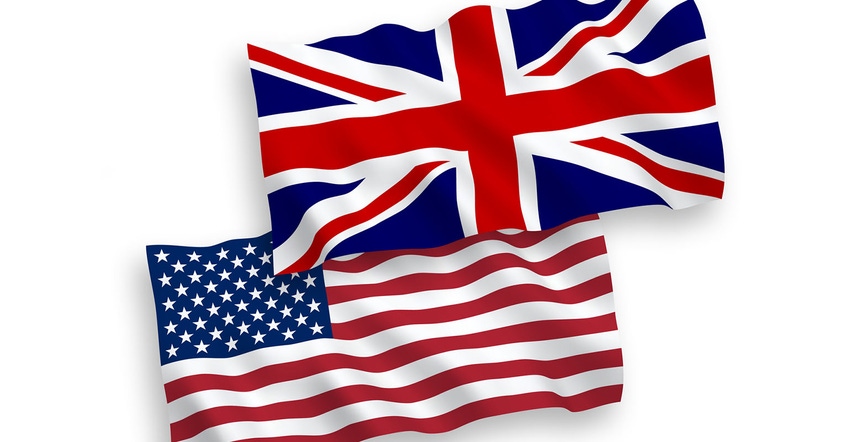
By Joe Mayes and Eric Martin
The U.K. and the U.S. are unlikely to be ready to strike a trade deal before 2023, in a blow to British hopes of a quick win from Brexit, according to people familiar with the matter.
President Joe Biden’s administration is focused on other priorities such as China and investing in domestic programs to boost the U.S. economy, and his legal power to fast-track a trade accord through Congress is due to expire on July 1.
According to one person familiar with the U.K.-U.S. talks, that power is unlikely to be renewed before at least 2023 -- because the midterm elections in 2022 will make trade legislation politically too sensitive to pass.
In London, the government has talked optimistically in public about the prospects of a U.S. agreement but officials are now downplaying the chances of imminent progress.
“The U.K. has always been clear that securing a mutually beneficial and comprehensive deal is more important than reaching agreement by any fixed date,” a spokesperson for the British government’s Department for International Trade said. The U.S. Trade Representative’s office declined to comment.
Prime Minister Boris Johnson spoke to Biden Friday but the official British readout of the call made no mention of the trade negotiations.
The slowdown will be disappointing to Johnson and his allies who had been keen to push for a fast deal as an early sign of the U.K.’s success as a global trading nation, newly released from the constraints of European Union membership.
Politically, the long wait for a deal also risks adding to the impression that Biden is keeping his distance from Johnson’s Britain, in contrast to Donald Trump, who publicly championed fast-track trade talks and was an enthusiastic backer of Brexit.
Irish history
Biden has been critical of the U.K.’s handling of its withdrawal from the EU and is keen to talk up his Irish ancestry. That came back into focus on Thursday, when the president referred to his great grandfather who fled Ireland in a so-called coffin ship “because of what the Brits had been doing.”
While Britain’s international trade secretary Liz Truss has said the majority of a trade text with the U.S. has been agreed, the most controversial elements of a deal -- like access for U.S. agricultural products such as chlorine-washed chicken or hormone-treated beef -- are yet to be negotiated.
Truss and new U.S. Trade Representative Katherine Tai held their first talks this week, a high-level call that focused on issues such as the coronavirus pandemic, reforming the World Trade Organization and fixing a long-running dispute over illegal aid to Airbus SE and Boeing Co.
The spokesperson for the U.K.’s Department for International Trade said Truss and Tai would have “further discussions on trade agreement negotiations” after Tai has considered the progress of talks so far.
In written answers to senators during her confirmation process in February, Tai said that the administration planned to review the state of talks completed under Trump and chart a path forward that’s consistent with Biden’s policy of prioritizing the interests of American workers, without giving a time-line for that process.
Two years away
“I have trouble seeing how the Biden administration makes this work in the next two years,” said Simon Lester, the associate director of the Center for Trade Policy Studies at the Washington-based Cato Institute. “I don’t know why they’d want to bring it up with all the other things on their agenda.”
David Henig, director of the U.K. Trade Policy Project at the European Centre for International Political Economy, agreed that the U.S. has other priorities now. “There’s no sense that anything is imminently about to happen,” he said. “This is the year you really want to fix Airbus-Boeing, particularly if you’re going after China.”
Permanently solving the current four-month tariff suspension by the U.S. in the Airbus-Boeing dispute, which covers trade worth about 550 million pounds ($755 million) with Britain and affects products such as whiskey and clotted cream, is a priority for Tai and Truss, according to two people familiar with their discussions. Progress on this issue is likely to happen much sooner than any breakthrough on a wider U.K.-U.S. free-trade agreement, the people said.
When momentum returns to the trade talks, the U.K. is hopeful that the new U.S. administration won’t unpick the chapters that have already been agreed in their five rounds of negotiations, which started in May 2020.
The British government also believes it will be able to go further in the deal on priority areas such as climate change, data and access to digital services than was possible under the Trump administration, one of the people said.
© 2021 Bloomberg L.P.
About the Author(s)
You May Also Like




